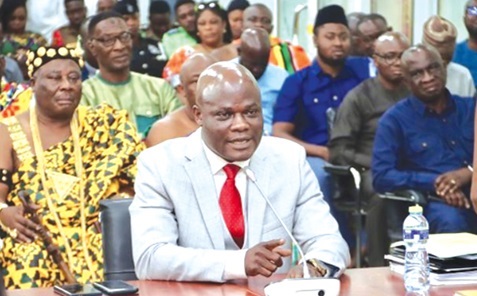As provided in Article 243 of the 1992 Constitution, after officially announcing the nomination of Metropolitan, Municipal and District Chief Executives (MMDCEs), they should be confirmed by not less than a two-thirds majority of members of the assembly present and voting at the meeting.
The framers of the Constitution might have ceded the power of confirmation to the assembly members as a way of devolving power, deepening democracy and ensuring inclusiveness in deciding who heads the assemblies and eventually becomes the President’s representative in the metropolis, municipals and districts.
Unfortunately, this aspect of our local governance system has been bruised, battered and demeaned in almost all the assemblies in the country.
Instead of focusing on a nominee’s competence, character and background during the confirmation process – vote casting to confirm or reject the nominees, the Assembly members have turned this legitimate responsibility into money-making enterprise or a cash cow venture.
In effect, the assembly members are now serving their selfish interests instead of serving the collective interest of the people in the assembly’s jurisdiction.
There have been numerous situations where the appointees are compelled to pay huge sums of money to the assembly members before securing their votes for confirmation.
And the implication for an appointee to incur such a huge debt before assuming an office that oversees resources for projects is not far-fetched.
One despicable incident which became public knowledge early last year, where the nominee as Municipal Chief Executive for Juaben Municipal Assembly in the Ashanti Region allegedly demanded back the money he paid to the assembly members to secure their votes, after he failed to obtain the threshold – at least two-thirds of the votes cast for his confirmation– is just one out of many cases happening in most of the assemblies, if not all.
This case is still pending in court and the office of the Special Prosecutor.
It, thus, calls for strict monitoring of the confirmation process in all the assemblies throughout the country, if we want the process to enhance the local governance system. Corruption must be fought from all angles.
To avoid such retrogressive and unpleasant developments that have persisted in the Fourth Republic, there should be an amendment to the current confirmation arrangement.
Either the chief executives are elected or members of the public should be made to submit any undesirable report they may have on a nominee, with evidence, within two weeks after publication of a person’s nomination as district chief executive.
Thereafter, nominees without any damning report against them should be deemed confirmed.
Should this proposal be accepted, the chief executives can assert authority in the performance of their functions by not compromising the position they are yet to occupy.
Also, as this unconscionable practice forms the cradle of corruption in the assemblies, it should be dealt with decisively.
Kwame Amoah
Fmr. Gt. Accra Reg. Director, EC;
President, Global Elections Gurus (GEG).
E-mail: kwmoah@yahoo.com

